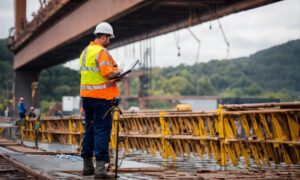
A structural engineer in the construction industry is primarily responsible for the design and analysis of structures to ensure they are safe, stable, and capable of withstanding the loads and forces they will encounter during their lifespan. Here’s a detailed explanation of their role:
- Designing Structures: Structural engineers work closely with architects, builders, and other stakeholders to design structures such as buildings, bridges, dams, towers, and other infrastructure projects. They consider factors like building codes, safety standards, environmental conditions, and client requirements to create designs that are both functional and aesthetically pleasing.
- Analyzing Structural Integrity: Before construction begins, structural engineers analyze the proposed design to assess its structural integrity and performance. They use advanced software and mathematical calculations to simulate various loads and forces, including gravity, wind, seismic activity, and soil pressure, to ensure that the structure can withstand them without failure.
- Selecting Materials: Structural engineers select appropriate materials for construction based on the specific requirements of the project and the structural design. They consider factors such as strength, durability, cost, and sustainability when choosing materials like concrete, steel, timber, and composites.
- Detailing Structural Components: Structural engineers create detailed drawings and specifications for structural components such as beams, columns, slabs, and foundations. These drawings provide instructions for construction workers on how to build each component to ensure they meet design requirements and perform as intended.
- Reviewing Construction Plans: During the construction phase, structural engineers review construction plans and documents to ensure they align with the approved structural design. They may provide guidance to construction teams, resolve design issues, and make adjustments as necessary to address unforeseen challenges or changes in the project scope.
- Inspecting Construction Progress: Structural engineers conduct on-site inspections to monitor construction progress and ensure that structural elements are being built according to the approved design and specifications. They verify that materials are installed correctly, dimensions are accurate, and quality standards are met to prevent construction defects and ensure safety.
- Certifying Structural Integrity: Once construction is complete, structural engineers may perform final inspections and tests to certify the structural integrity of the completed project. They issue certificates of compliance or occupancy to confirm that the structure meets all regulatory requirements and is safe for occupation or use.
Overall, structural engineers play a crucial role in the construction industry by designing, analyzing, and ensuring the safety and stability of structures. Their expertise is essential for creating buildings and infrastructure that are durable, functional, and capable of withstanding the rigors of their environment.
